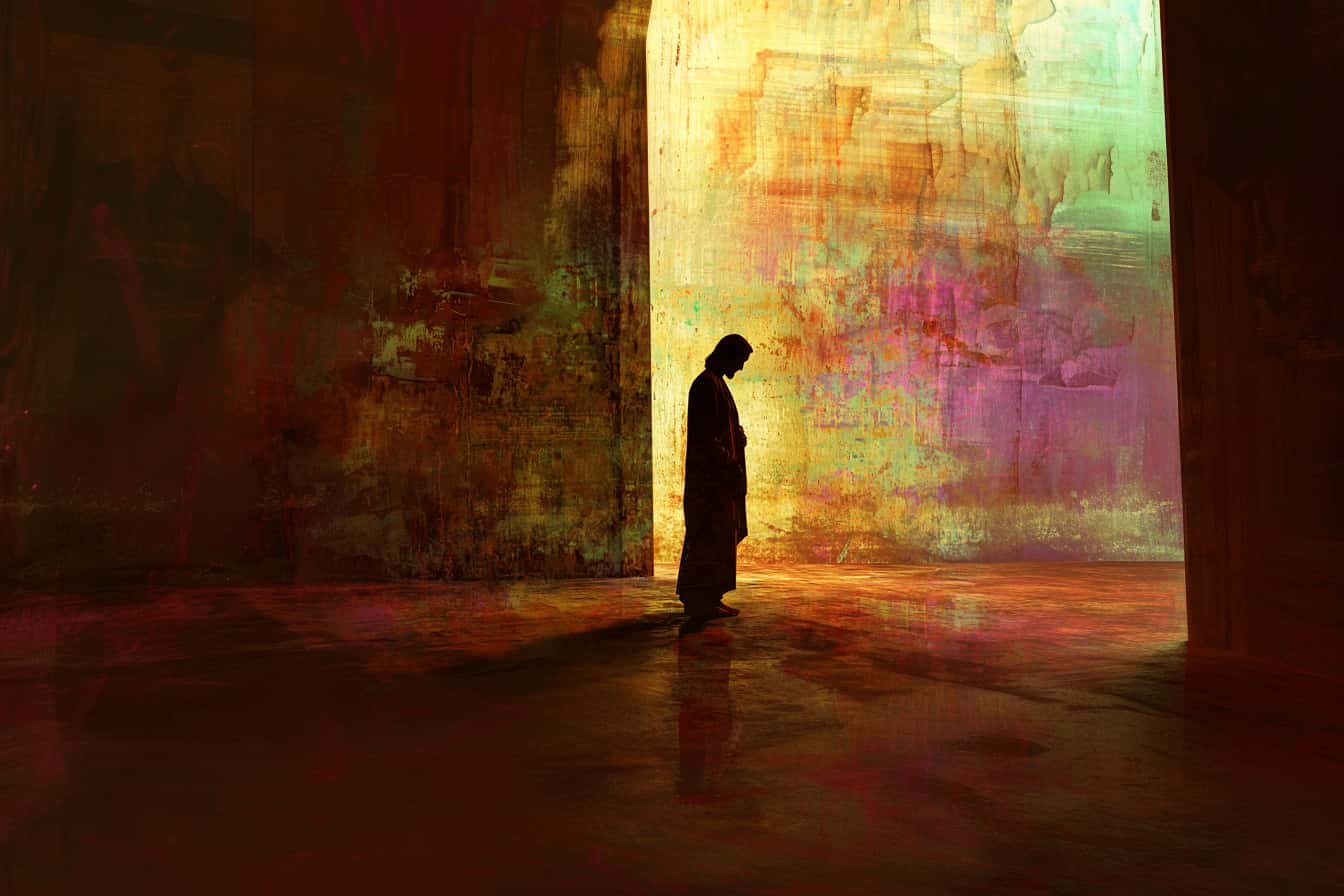Discover Jesus \ Events \Jesus Endures an Hour of Humiliation
Tag
Jesus Endures an Hour of Humiliation
Between Jesus' two trials, he endured an hour of cruel abuse from guards and servants, who followed the Sanhedrin's example. Despite the brutality, Jesus remained silent, not resisting the taunts and violence inflicted upon him.

Table of Contents
Summary
Jewish law required two trials when the death penalty was in question. Between Jesus’ first and second trials, he was left alone in the company of guards and servants who abused him. This abuse lasted an hour, and throughout it all, the Master did not protest or even resist the taunts and blows that were so cruelly inflicted on him by supposed civilized men. And they were only following the example set by Jesus’ persecutors, the members of the Sanhedrin court who were demanding the torture and death of a man of peace and love – even the God-man Jesus.
Arrest and Appearance Before Annas
On Thursday, April 6, 30 CE, around midnight, Jesus was arrested by Roman and Sanhedrin guards. He was taken before a former high priest and one in supreme authority, a man named Annas. Annas questioned Jesus and one of his guards struck Jesus on the face when he replied truthfully to a question from Annas.
Then, when Annas asked whether it was true that he claimed to be the Messiah, Jesus only answered, "So you have said." About that time, three o’clock in the morning, a messenger of Caiaphas arrived, wanting to know when Jesus would be brought before the Sanhedrin court. Caiaphas was the son-in-law of Annas and the official head of the Sanhedrin. Annas then ordered Jesus to be taken to Caiaphas’ palace.
Appearance Before Caiaphas
When Jesus stood serenely silent during Caiaphas’ questioning and the false testimony from biased witnesses, Caiaphas rushed up to Jesus and demanded to know if he was "the Deliverer, the Son of God." After Jesus said, "I am," Caiaphas slapped him. This answer was enough to ensure the death penalty for blasphemy. When this first trial ended, the other members of the Sanhedrin filed past Jesus, slapping and spitting on him as they left the court.
Second Trial
Jewish law required that, in the matter of passing the death sentence, there should be two sessions of the court. This second session was to be held on the day following the first, and the intervening time was to be spent fasting and mourning by the members of the court. But these men could not wait until the next day for the confirmation of their decision that Jesus must die. They waited only one hour.
The Bitterest Cup
During that hour, Jesus was left in the audience chamber in the custody of the temple guards, who, with the servants of the high priest, amused themselves by heaping every sort of indignity upon him. They mocked him, spit on him, and cruelly beat him. They would strike him in the face with a rod and then say, "Prophesy to us, you the Deliverer, who it was that struck you." And this went on for one full hour, reviling and mistreating this unresisting man who had always preached, and now practiced, non-violence.
Throughout this awful hour, Jesus uttered not a word. To this gentle and sensitive soul, there was no more bitter portion of his cup of humiliation than this terrible time at the mercy of these ignorant and cruel guards and servants who had been stimulated to abuse him by the example of the members of the so-called court. Jesus was unmoved by their threats and undaunted by their assaults.
What is the trait in humans that leads them to insult and physically assault what they cannot spiritually attain or intellectually achieve? In the half-civilized person, an evil brutality still lurks, seeking to vent itself upon those superior in wisdom and spiritual attainment. Witness the evil coarseness and brutal ferocity of these supposedly civilized men as they derived perverse pleasure from this physical attack upon the unresisting Son of Man. As these insults, taunts, and blows fell upon Jesus, he did not defend himself but was not defenseless. He actively chose to be unmoved by their assaults.
Final Triumph
Imagine the shudder of indignation that swept over a vast universe as the celestial beings witnessed this sight of an incarnated Creator Son submitting himself to the will of his ignorant and misguided creatures. Having lived a full life of revealing God to man, Jesus made a new and unprecedented revelation of man to God.
When the show trials ended and the inevitable outcome was announced, even more abuse was forced on Jesus. Not once did he complain or protest, and twice, while hanging on the cross, he smiled at those he spoke with. After this wicked display of cold-hearted perversity by the Sanhedrin, no one can say God does not know how cruel life on earth can be. Through this experience, the creator of the universe vicariously lived and died as any faith-filled human might in a similar situation.
It was a dark Friday afternoon at Golgotha but gloriously bright on the Sunday resurrection morning at the tomb. Jesus proved that all will awake in a new form and be rewarded many-fold in the next life for keeping faith while enduring the brief and sometimes horrific trials of this life.
